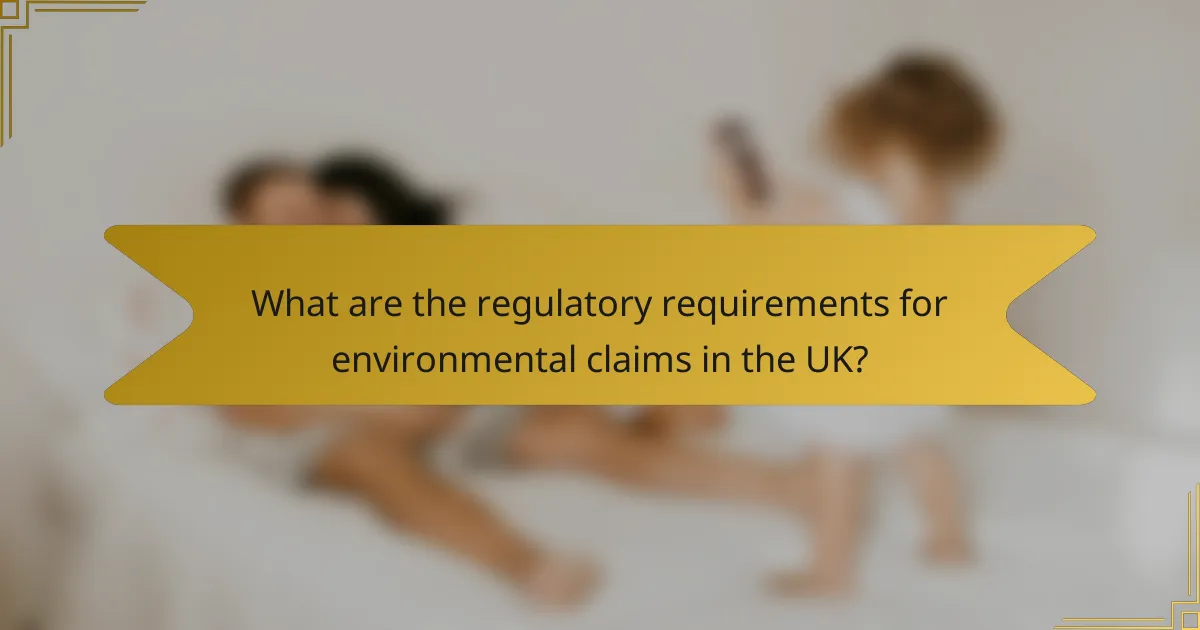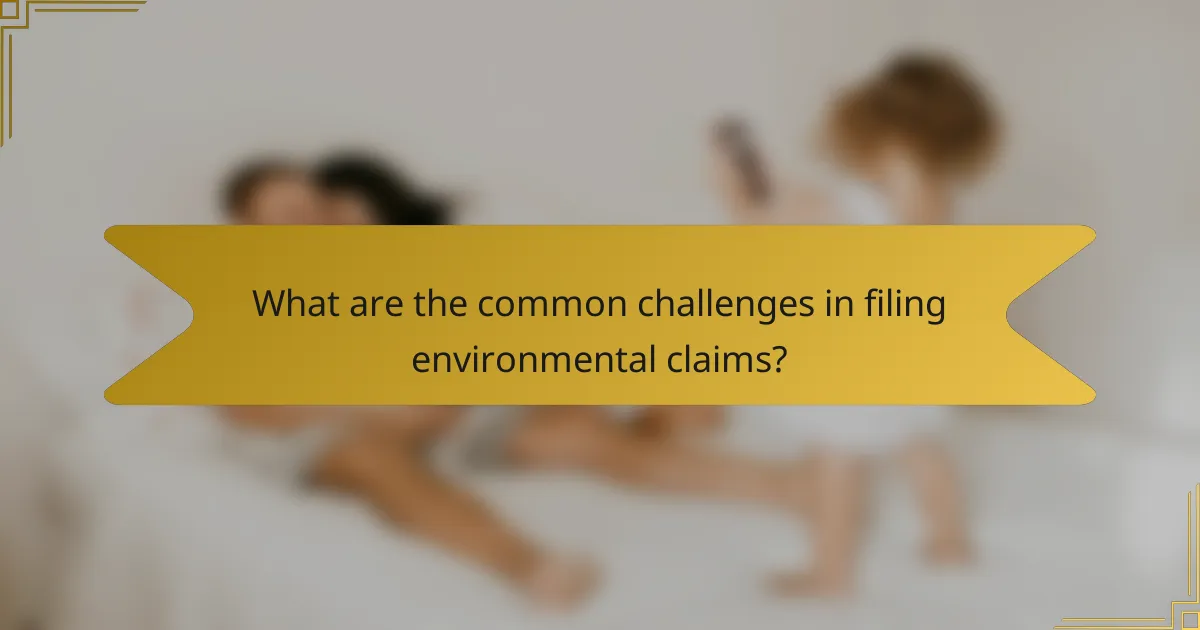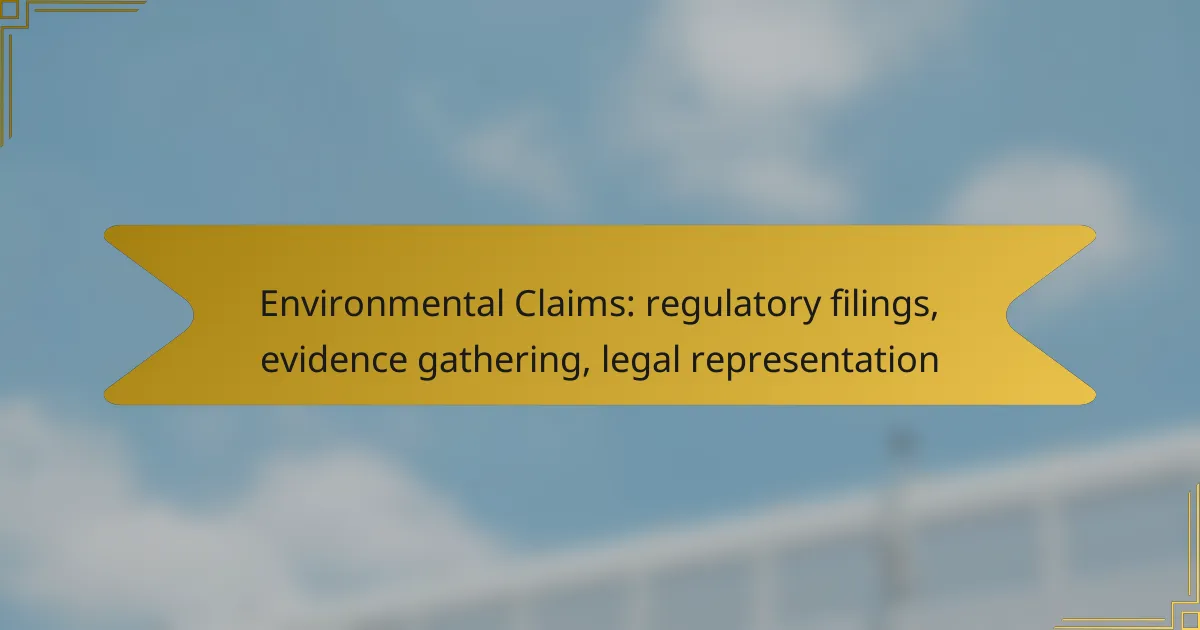In the UK, businesses making environmental claims are required to comply with stringent regulatory standards to ensure that their assertions are accurate and transparent. This involves a thorough process of evidence gathering, which includes data collection and verification to substantiate claims about environmental impacts. Additionally, legal representation is available to navigate the complexities of environmental law, helping individuals and organizations address compliance issues and pursue litigation when necessary.

What are the regulatory requirements for environmental claims in the UK?
In the UK, businesses making environmental claims must adhere to specific regulatory requirements to ensure accuracy and transparency. These regulations aim to prevent misleading information and promote genuine sustainability efforts.
UK Advertising Standards Authority guidelines
The UK Advertising Standards Authority (ASA) provides clear guidelines for environmental claims in advertising. Claims must be substantiated with evidence, and businesses should avoid vague terms that could mislead consumers.
For instance, terms like “eco-friendly” or “green” should be backed by clear, factual evidence demonstrating the environmental benefits. Companies are encouraged to provide specific details about the sustainability of their products or services.
Environmental Protection Act compliance
The Environmental Protection Act sets forth legal requirements for businesses regarding environmental claims. Companies must ensure that their claims do not violate any environmental regulations or misrepresent their compliance with environmental standards.
For example, if a product is marketed as recyclable, the company must ensure that it meets the criteria for recycling as outlined in the Act. Failure to comply can result in legal repercussions and damage to reputation.
European Union regulations impact
Although the UK has left the EU, many European regulations still influence environmental claims. Businesses must be aware of EU standards that may apply, especially if they operate in or export to EU countries.
For example, the EU’s Green Claims Directive aims to ensure that environmental claims are substantiated and transparent across member states. UK businesses should consider these regulations when making claims to avoid potential conflicts and ensure compliance in international markets.

How to gather evidence for environmental claims?
Gathering evidence for environmental claims involves systematic data collection, verification, and documentation to support assertions about environmental impacts. This process is essential for legal compliance and credibility in environmental advocacy.
Data collection methods
Data collection for environmental claims can include surveys, field studies, and remote sensing. Each method has its strengths; for instance, surveys can provide qualitative insights while remote sensing offers quantitative data over large areas. Consider using a combination of methods to ensure comprehensive evidence.
When collecting data, ensure it aligns with relevant standards such as ISO 14001 for environmental management. This helps in maintaining consistency and reliability in your findings.
Third-party verification services
Third-party verification services play a crucial role in validating environmental claims. These organizations assess the data collected and provide an unbiased review, which enhances the credibility of the claims made. Engaging a reputable service can also help in meeting regulatory requirements.
Common third-party verifiers include environmental consultancies and certification bodies. Look for those accredited by recognized organizations to ensure their assessments are trustworthy and recognized in your jurisdiction.
Case studies and examples
Case studies can illustrate successful evidence gathering for environmental claims. For example, a company that reduced its carbon footprint might present data from energy audits and emissions tracking to substantiate its claims. These real-world examples can serve as a blueprint for others.
Additionally, reviewing legal cases where environmental claims were upheld can provide insights into effective evidence strategies. Analyzing these cases can reveal common pitfalls and successful approaches, guiding future efforts in evidence gathering.

What legal representation is available for environmental claims?
Legal representation for environmental claims includes various options tailored to address specific environmental issues, regulatory compliance, and litigation. Individuals and organizations can seek assistance from specialized law firms, legal aid services, or pursue notable legal cases that set precedents in the field.
Specialized environmental law firms
Specialized environmental law firms focus on cases related to environmental regulations, pollution, land use, and conservation. These firms often have extensive experience navigating complex legislation and can provide tailored legal strategies to protect clients’ interests.
When selecting a firm, consider their track record in similar cases, client testimonials, and their understanding of local environmental laws. Many firms offer initial consultations to assess the viability of a case, which can help determine the best course of action.
Legal aid options
Legal aid services provide support for individuals who may not afford private legal representation. In the context of environmental claims, these services can assist with issues like housing rights affected by pollution or community advocacy for environmental justice.
Eligibility for legal aid typically depends on income and the nature of the claim. It’s advisable to check local legal aid organizations or government websites for specific criteria and available resources in your area.
Notable legal cases in the UK
In the UK, several landmark legal cases have shaped environmental law and set important precedents. For instance, the case of R (on the application of Friends of the Earth) v. Heathrow Airport Limited challenged the expansion of Heathrow Airport on environmental grounds, emphasizing the need for comprehensive assessments of climate impact.
Another significant case involved the UK government’s failure to meet air quality standards, which led to legal action by environmental groups. These cases highlight the importance of legal representation in holding corporations and governments accountable for environmental issues.

What are the common challenges in filing environmental claims?
Filing environmental claims often involves overcoming significant hurdles, including substantiating claims, navigating complex regulations, and managing legal costs. These challenges can complicate the process and impact the overall success of the claim.
Proving substantiation of claims
Proving the substantiation of environmental claims requires robust evidence that supports the assertions made. This often involves gathering scientific data, expert testimony, and documentation that aligns with established environmental standards.
Common pitfalls include relying on anecdotal evidence or failing to document compliance with relevant regulations. It’s crucial to maintain thorough records and seek expert opinions to strengthen the case.
Navigating regulatory complexities
Navigating regulatory complexities is a significant challenge in environmental claims, as different jurisdictions may have varying laws and requirements. Understanding local, state, and federal regulations is essential to ensure compliance and avoid legal pitfalls.
Consulting with legal experts who specialize in environmental law can help clarify these complexities. Additionally, staying updated on changes in regulations can prevent potential issues during the filing process.
Cost implications of legal processes
The cost implications of legal processes in environmental claims can be substantial, often involving attorney fees, expert witness costs, and potential court fees. These expenses can add up quickly, making it essential to budget accordingly.
To manage costs, consider alternative dispute resolution methods, such as mediation, which can be less expensive than traditional litigation. Additionally, assessing the potential return on investment of pursuing a claim can help determine if the costs are justified.

How to choose the right legal representation for environmental claims?
Selecting the right legal representation for environmental claims involves assessing a law firm’s expertise, experience, and track record in handling similar cases. Prioritize firms that demonstrate a strong understanding of environmental regulations and have a history of successful outcomes in this niche area of law.
Criteria for selecting a law firm
When choosing a law firm for environmental claims, consider factors such as specialization, reputation, and communication style. Look for firms that focus specifically on environmental law, as they will have a deeper understanding of relevant regulations and precedents.
Evaluate the firm’s size and resources; larger firms may offer more extensive support, while smaller firms might provide more personalized service. Additionally, assess their fee structure to ensure it aligns with your budget, whether through hourly rates or contingency fees.
Experience in environmental law
Experience in environmental law is crucial when selecting legal representation. Look for firms that have handled cases similar to yours, whether related to pollution, land use, or regulatory compliance. A firm with a solid background in these areas will be better equipped to navigate the complexities of your case.
Inquire about the attorneys’ individual experience, including their education, years in practice, and involvement in relevant organizations. A lawyer who has participated in environmental law conferences or has published articles on the subject may bring valuable insights to your case.
Client testimonials and success rates
Client testimonials and documented success rates can provide insight into a law firm’s effectiveness. Seek out reviews from previous clients to gauge their satisfaction with the firm’s services and outcomes. Positive feedback often indicates a firm’s ability to deliver results.
Request information on the firm’s success rates in environmental claims, including settlements and verdicts. A firm that has consistently achieved favorable outcomes will likely have the skills and strategies necessary to advocate effectively on your behalf.

What emerging trends affect environmental claims in the UK?
Emerging trends in the UK are significantly reshaping environmental claims, primarily driven by evolving legislation and increasing consumer expectations. Companies must navigate these changes carefully to ensure compliance and maintain trust with their stakeholders.
Impact of climate change legislation
The UK government has implemented stringent climate change legislation aimed at reducing carbon emissions and promoting sustainability. This includes the legally binding target to achieve net-zero emissions by 2050, which influences how businesses formulate their environmental claims.
Companies must ensure that their claims align with these regulations, as misleading statements can lead to legal repercussions. Regular audits and compliance checks are essential to verify that environmental claims are substantiated by credible evidence.
Consumer demand for transparency
Consumers in the UK are increasingly demanding transparency regarding the environmental impact of products and services. This trend is pushing companies to provide clear, verifiable information about their sustainability practices and the lifecycle of their products.
To meet this demand, businesses should adopt clear labeling practices and consider third-party certifications to enhance credibility. Engaging with consumers through transparent communication can foster trust and loyalty, ultimately benefiting the company’s reputation and bottom line.
